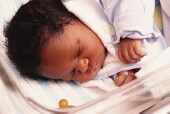
TUESDAY, April 26 (HealthDay News) — Most cases of bloodstream infections (sepsis) among newborns in the United States are caused by group B streptococci (GBS) and E. coli, a new study finds.
Sepsis, also known as blood poisoning, occurs when bacteria invade the bloodstream and cause a system-wide infection. It can lead to serious complications and poses a high risk of death in newborns.
Although the U.S. Centers for Disease Control and Prevention recommends universal screening of women at 35 to 37 weeks of pregnancy for GBS and antibiotics for those who are colonized, the researchers noted that many health providers fail to do such screening, even for some at-risk women.
This nationwide study of nearly 400,000 newborns found that the overall rate of sepsis was 0.98 per 1,000 live births, with 0.41 per 1,000 involving GBS and 0.28 per 1,000 involving E. coli.
GBS is the most common cause of sepsis in full-term newborns and E. coli is the most common cause in pre-term newborns.
“Infections occur in almost one case per thousand live births,” lead investigator Dr. Barbara Stoll, professor and chair of the department of pediatrics at Emory University School of Medicine, said in a university news release.
“With approximately 4 million births a year in the United States, this equates to a substantial burden of disease. We estimate that approximately 3,000 infants a year develop early-onset sepsis. With current mortality rates, approximately 300 to 350 deaths per year are associated with neonatal sepsis.”
Early-onset sepsis refers to sepsis that occurs in infants less than 72 hours old.
“Our findings suggest that accurate point-of-care diagnostic tests at the time a woman comes in for delivery would enhance our ability to identify at-risk women,” said Stoll, who also recommended increasing the use of electronic medical records.
“A community health record that links the medical record in a physician’s office with the hospital where the woman gets care could enhance identification and therapy for at-risk women,” she said. “If a woman has been screened for GBS and is known to be colonized, that information should be available to the health care team taking care of her at the time she is in labor.”
The study was published online April 25 and appears in the May print issue of the journal Pediatrics.
More information
The Nemours Foundation has more about children and sepsis.

